Our Town: A Documentary About Greenacres On View, Online
- Details
- Written by: Joanne Wallenstein
- Hits: 3071
 This fountain once bordered the Bronx River ParkwayIt’s been more than 100 years since ground was broken on the first homes in Greenacres and though much has changed, many signs of Scarsdale’s earliest residents remain. Strolling the streets you can find remnants of a gun powder factory across the street from Hitchcock Church, a stone wall that divided Scarsdale and White Plains on Farley Road and even earlier, a sign commemorating the Battle of White Plains in the Revolutionary War that took place on a hill on Mamaroneck Road.
This fountain once bordered the Bronx River ParkwayIt’s been more than 100 years since ground was broken on the first homes in Greenacres and though much has changed, many signs of Scarsdale’s earliest residents remain. Strolling the streets you can find remnants of a gun powder factory across the street from Hitchcock Church, a stone wall that divided Scarsdale and White Plains on Farley Road and even earlier, a sign commemorating the Battle of White Plains in the Revolutionary War that took place on a hill on Mamaroneck Road.
These landmarks and information about the original developers of the neighborhood are detailed in a rich documentary about the history of Greenacres, produced by the Scarsdale Historical Society. The film debuted at the Scarsdale Library on March 15 and is now available for all to see on the Scarsdale Historical Society’s website.
Originally a group of estates, Greenacres was built into a suburban community by developers and families who subdivided their land to create the neighborhoods we now enjoy. Many of the Tudor revivals and Colonial style homes that were constructed by the original builders are still treasured by residents today.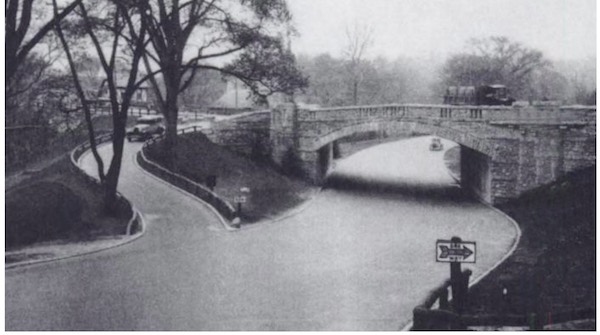 The Bronx River Parkway was completed in 1924.
The Bronx River Parkway was completed in 1924.
Also at the time the neighborhood was built, Scarsdale Golf Club was constructed on what was formerly Harte’s Farm in 1922. Early members enjoyed golf, skeet shooting, ice skating and sledding.
The film details a beautiful fountain that once stood in front of a tea house on Fountain Terrace. That fountain remained until 1967 when the county widened the Bronx River Parkway and closed the park.
Perhaps the most enchanting story is one of a 1,380 foot tunnel that was built in 1939 to drain water from the field across from Walworth Avenue to Brite Avenue and down to the Bronx River. If anyone can find the entrance, let us know.
Watch the movie here – no matter what part of town you live in, you’re sure to be amazed at the history of our Village in a park.
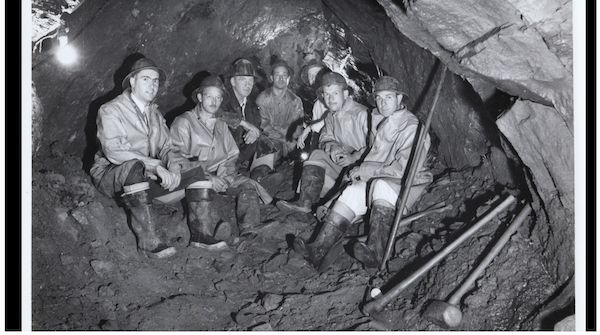 The 1,380 foot Greenacres Tunnel
The 1,380 foot Greenacres Tunnel
Music Festival Returns to Scarsdale on Saturday June 3, 2023
- Details
- Written by: Joanne Wallenstein
- Hits: 2175
 On Saturday, June 3, 2023, the Scarsdale Business Alliance (SBA) will host its 3rd Annual Scarsdale Music Festival (SMF), presented by Morgan Stanley. This year’s event will take place rain or shine in Scarsdale Village from 12-7pm and will benefit the Center for Cancer Care at White Plains Hospital.
On Saturday, June 3, 2023, the Scarsdale Business Alliance (SBA) will host its 3rd Annual Scarsdale Music Festival (SMF), presented by Morgan Stanley. This year’s event will take place rain or shine in Scarsdale Village from 12-7pm and will benefit the Center for Cancer Care at White Plains Hospital.
The SBA is thrilled to announce this year’s line-up of extraordinary talent who will be performing on two main stages throughout the day. Ten bands were chosen through an extensive selection process from over 50 submitted applicants from Scarsdale and the greater Tri-State Area.
● Alex Cano - Scarsdale-based artist with a debut album, “Every Rise of the Sun,” a story of resilience and survivorship and a raw slice of Rock n’ Roll.
● BOMBZR - An original, exciting, and groovin' supergroup on the rise in the NYC music scene, currently working on their debut album with three singles already released and streaming on all platforms.
● Conversing with Oceans - a fully evolved indie rock band based in Westchester looking to their rock past to explore new sounds and musical landscapes. Their debut LP “WILD / DREAMS” is a dedicated rock album at heart, displaying what these four musicians are capable of together.
● Gentlemen of Soul LSM - The top soul and R&B tribute band on the East Coast. A talented, dynamic 3-man vocal group from NYC, accompanied by a 4-piece band bringing Classic and Neo Soul, and R&B music to the stage.
● Rennie Pincus & Friends with Lovelight - Scarsdale-based band whose recent album, DEAL, explores the music of The Grateful Dead and features very special guests Elliot Easton (The Cars), Jack Petruzelli (Joan Osborne), Matt Rae (Arlen Roth), and Annalyse & Ryan.
● Rachel Bochner - Scarsdale native singer-songwriter turning the trials of navigating your twenties into pop music anyone can sing along to. With nearly 100,000 monthly listeners on Spotify and growing, Rachel has created a musical thumbprint that can only be recognized as her own.
● Skyfactor - NYC/Westchester-based band with members from Scarsdale. Their newest album is entitled "A Thousand Sounds," and they’re the band behind the song "OK" from MTV's hit show “Teen Mom.”
● The Del Bocas - A Scarsdale based-band, together for over ten years, see themselves as sort of a "wild jukebox" - with a large repertoire of songs from the 60’s to today.
● The Velcrows - Scarsdale-based band with 16 years together, putting their own spin on playing Rock & Roll, Rhythm & Blues, and some funky upbeat covers, which crowds will recognize.
We are also excited to welcome one of the winners of the 2023 NYS Music March Madness to our line-up. This annual music showdown competition has been shining a spotlight on talented artists and musicians from across the Empire State.
The Scarsdale Music Festival is an exceptional, family-friendly community event that will bring together people of all ages to celebrate their love of music, food, and community. The SBA is thankful to all the 2023 SMF event sponsors for their generous support.
● Presenting Sponsor: Morgan Stanley
● The Live Stages are presented by Advocate Brokerage Corp. with Pure, Houlihan Lawrence & Pepe Auto Group
● The Grand Tasting Zone is presented by Zachy’s & Julia B. Fee Sotheby’s International Realty
● The Family Fun Zone is presented by Scarsdale Moms
● Platinum sponsors: Compass, M.S. Walker, Spencer East Realty, The UPS Store
● Gold sponsors: Douglas Elliman, Scarsdale Security
● Silver Sponsors: Mark Jessamy Photography, NYS Music, Partyline Rentals, Rudy's Music, Westchester Magazine
The SMF is a free community event, with suggested donation tickets to benefit White Plains Hospital Center for Cancer Care. Tickets will go on sale in April. The SMF food vendor lineup and more details about this year’s expanded Family Fun Zone will be announced soon.
The Scarsdale Music Festival is a not-to-be missed experience! The SBA is a non-profit organization dedicated to supporting the Village of Scarsdale and its local businesses.
For event information and sponsorship opportunities:www.scarsdalemusicfestival.com
follow us on Instagram and Facebook @scarsdalemusicfestival.
For more information about the Scarsdale Business Alliance: www.scarsdalebusinessalliance.com and follow us on Instagram and Facebook @scarsdalebusiness.
The Sporting Life in Scarsdale: Historic Photos on Display
- Details
- Written by: Joanne Wallenstein
- Hits: 2088
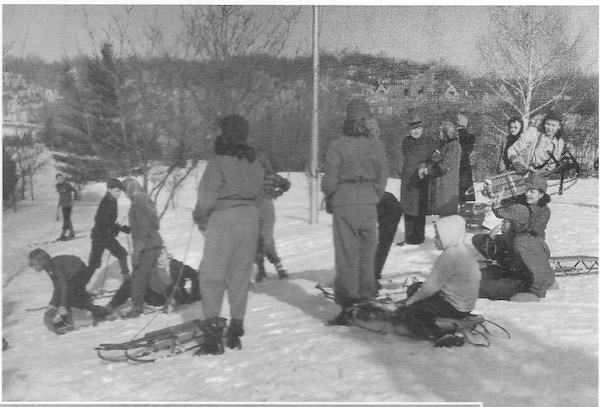 Sledding and skiing on the grounds of Scarsdale Golf Club, c. 1930’s. Credit: Scarsdale Golf ClubA new exhibit on display at Scarsdale Library, curated by the Scarsdale Historical Society, documents the development of winter sports in Scarsdale. Using photos from the Westchester County Archives, the Scarsdale Inquirer, Fox Meadow Tennis Club and Scarsdale Golf Club – (who celebrates its 125th anniversary this year), Leslie Chang brings to life the history of platform tennis, ice skating and coasting (sledding) by some of Scarsdale’s earliest residents.
Sledding and skiing on the grounds of Scarsdale Golf Club, c. 1930’s. Credit: Scarsdale Golf ClubA new exhibit on display at Scarsdale Library, curated by the Scarsdale Historical Society, documents the development of winter sports in Scarsdale. Using photos from the Westchester County Archives, the Scarsdale Inquirer, Fox Meadow Tennis Club and Scarsdale Golf Club – (who celebrates its 125th anniversary this year), Leslie Chang brings to life the history of platform tennis, ice skating and coasting (sledding) by some of Scarsdale’s earliest residents.
At a reception on Wednesday night March 1 to celebrate the opening of "Scarsdale On Ice," Chang told some captivating stories about the sporting life in Scarsdale.
The earliest reference to skating took place on “Scarsdale Lake,” which was formed when a dam was built in the Bronx River in 1913 that created a lake, just above the current waterfall near Scarsdale Village. Skaters also used the Duck Pond and Greenacres Pond, along with pop-up rinks created by flooding sections of Crossway Field, Hyatt Field and the Brite Avenue Tennis Courts.
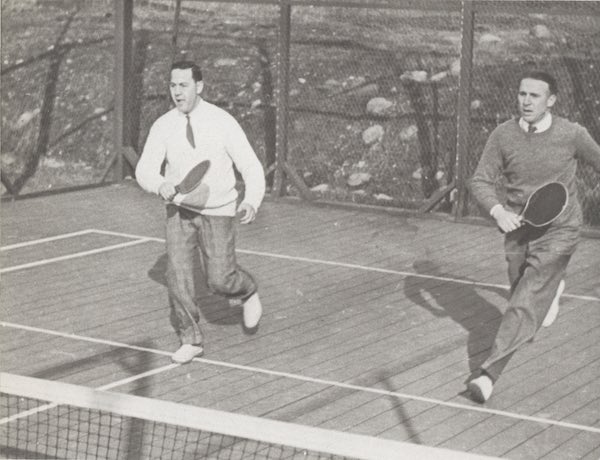 Charlie O'Hearn and Jim Hynson play platform tennis at FMTC in 1938. Credit: Fox Meadow Tennis ClubIn 1952 the Recreation Department hosted a pop-up rink by flooding a 75 X 100 foot section of the Brewster Road parking lot at Scarsdale High School. During the holiday break, a reported 3,200 skaters turned out to enjoy the rink, floodlights and music. In 1973 a $500,000 bond proposal was made to build a skating rink the size of Rye Playland near the Scarsdale Pool, but it failed to get sufficient votes.
Charlie O'Hearn and Jim Hynson play platform tennis at FMTC in 1938. Credit: Fox Meadow Tennis ClubIn 1952 the Recreation Department hosted a pop-up rink by flooding a 75 X 100 foot section of the Brewster Road parking lot at Scarsdale High School. During the holiday break, a reported 3,200 skaters turned out to enjoy the rink, floodlights and music. In 1973 a $500,000 bond proposal was made to build a skating rink the size of Rye Playland near the Scarsdale Pool, but it failed to get sufficient votes.
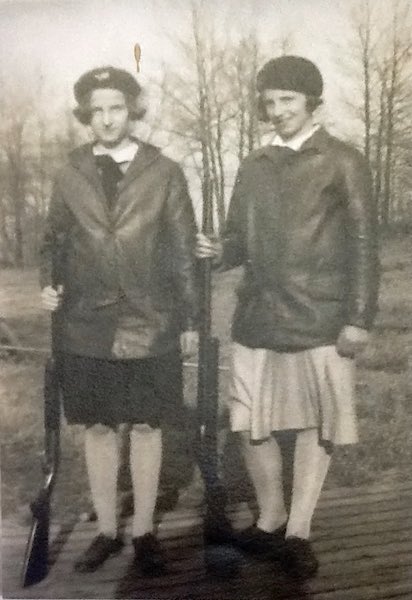 Joslyn and Sally Magowan trap shooting at the Scarsdale Golf Club in 1928. The sport was once popular during the club's off season. Credit: Magowan - Birdzell FamilyIn the 1920's two skilled ice dancers, James Cogswell and Fessendon Blanchard, taught others at Fox Meadow Tennis Club where the courts were flooded to form a rink. Skaters danced to the accompaniment of Viennese Waltzes and German Polkas that were amplified over the courts. But these two are even more famous for developing the sport of Platform Tennis. In 1928 they built the first court at their home above Ardsley Road and tested different racquets and balls. After losing too many balls that flew down Ardsley Road, they built a chicken wire fence around the court. Eventually they convinced Fox Meadow Tennis Club to build their first platform tennis court in 1931 and the club found that it improved their membership numbers during the winter months. The rest is history!
Joslyn and Sally Magowan trap shooting at the Scarsdale Golf Club in 1928. The sport was once popular during the club's off season. Credit: Magowan - Birdzell FamilyIn the 1920's two skilled ice dancers, James Cogswell and Fessendon Blanchard, taught others at Fox Meadow Tennis Club where the courts were flooded to form a rink. Skaters danced to the accompaniment of Viennese Waltzes and German Polkas that were amplified over the courts. But these two are even more famous for developing the sport of Platform Tennis. In 1928 they built the first court at their home above Ardsley Road and tested different racquets and balls. After losing too many balls that flew down Ardsley Road, they built a chicken wire fence around the court. Eventually they convinced Fox Meadow Tennis Club to build their first platform tennis court in 1931 and the club found that it improved their membership numbers during the winter months. The rest is history!
The Scarsdale Historical Society has produced an engaging exhibit of posters featuring historic photos and stories about winter sports in Scarsdale that is on view to the public at Scarsdale Library. Check out "Scarsdale on Ice," to fully understand how our forbearers left behind the legacy of the sporting life that continues today.
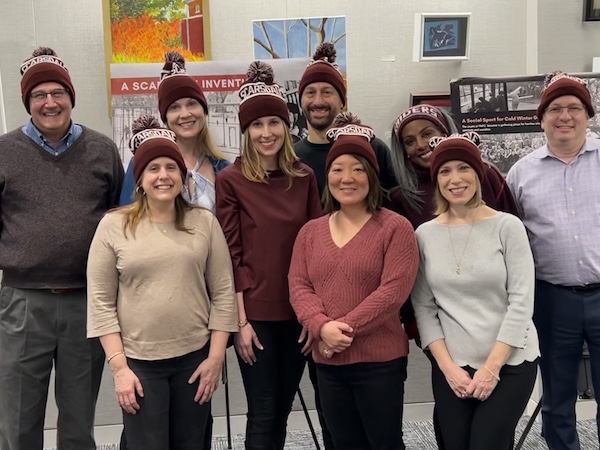 The Board of the Scarsdale HIstorical Society at the opening of "Scarsdale on Ice."
The Board of the Scarsdale HIstorical Society at the opening of "Scarsdale on Ice."
Baroque and Beyond Music Festival: Hoff-Barthelson’s Celebration of Music
- Details
- Written by: Joanne Wallenstein
- Hits: 1443
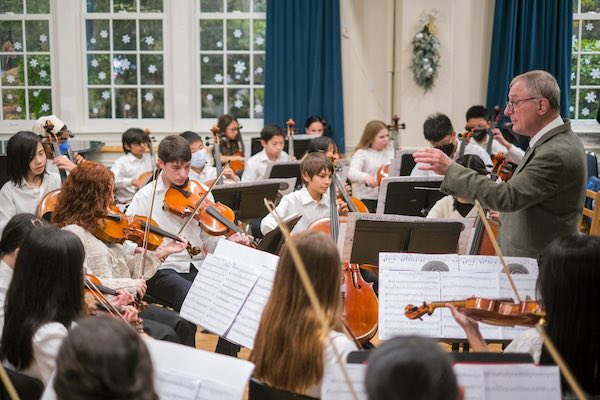 Baroque and Beyond Music Festival: Hoff-Barthelson’s Celebration of Music composed between 1600-1750
Baroque and Beyond Music Festival: Hoff-Barthelson’s Celebration of Music composed between 1600-1750
Festival to feature music of great Germanic composers — Bach, Telemann, and Handel — as well as masters from other lands
Hoff-Barthelson Music School’s Baroque and Beyond Music Festival, celebrating music composed between 1600 and 1750, takes place Saturday, March 11, through Sunday, March 19, 2023. The Festival, featuring music of the great Germanic composers – Bach, Telemann, and Handel – as well as masters from other lands, includes student recitals and instrumental and choral ensemble concerts.
Baroque and Beyond is part of the School’s “Festivals in Style” that introduces students to music from specific periods of music. Students enjoy the opportunity for detailed study of period solo and ensemble works and are invited to audition to participate in recitals. “The audition experience, regardless of the outcome, helps students develop positive habits around meeting deadlines, handling pressure, accepting criticism, learning the value of hard work, and sometimes even accepting disappointment—all valuable life skills,” said Ken Cole, Executive Director.
On Saturday, March 11, and Sunday, March 19, 2023, at 7:00 pm, student performances will take place at the Community Unitarian Universalist Congregation at White Plains, 468 Rosedale Avenue, White Plains. Ensembles scheduled to perform include the Festival Orchestra (Jun Nakabayashi, director); Suzuki Strings (Barbara Berg, director); Flute Clubs (Donna Elaine and Joseph Piscitelli, directors); Symphonette and Chamber Orchestra (Robert Schwartz, director); Wind Ensemble (Joseph Piscitelli, director); Beginner Voices (Yuki Hiruma Charlesworth, director); and the Adult Handbell Choir (Donna Elaine, director). Admission to these two events is a suggested donation of $20; HBMS students may attend free of charge.
Student recitals are scheduled at the Music School throughout the Festival. Visit the School website – www.hbms.org – for dates and times. These recitals are free of charge and open to the public to attend.
The Baroque and Beyond Festival is made possible, in part, with a grant from the Westchester Community Foundation, a division of The New York Community Foundation. Westchester Community Foundation’s mission is to connect generous people to the causes they care about and invest in transformative ideas and organizations to improve lives and strengthen our community. WCF is a division of The New York Community Trust, one of the largest community foundations in the country, with assets of approximately $2.6 billion.
For Additional Information
For additional information: 914-723-1169, [email protected], www.hbms.org.
Gifts with Love from Scarsdale Village
- Details
- Written by: Joanne Wallenstein
- Hits: 2213
 You don’t have to look farther than Scarsdale Village for some luxe gifts for Valentine’s Day. Whether you want bling, scent, a spa treatment or something red to wear, you’ll find it right here.
You don’t have to look farther than Scarsdale Village for some luxe gifts for Valentine’s Day. Whether you want bling, scent, a spa treatment or something red to wear, you’ll find it right here.
Take a look at what local merchants have in store for a gift of love:
For 118 years and five generations, Wilson & Son Jewelers has been Westchester's premiere family jeweler. They are proud to have been a part of your most important milestones and events for over a century. Whether a diamond or a timepiece, their elegant showroom, and exceptional team are happy to help you find your next gift. Wilson and Son Jewelers welcomes you to their newly expanded location at 10 Spencer Place in Scarsdale.
Here are their recommendations for Valentine’s Day:
Monica Rich Kosann Eighteen Karat Yellow Gold and Diamond Charlotte  Locket
Locket
Your story is set in stone. Meet "Charlotte". This oval locket features stunning white diamond accents. Perfect on its own or layered with your other favorite pieces. Your stories are important, "Charlotte" will help you tell them.
Marco Bicego Eighteen Karat Yellow Gold and Diamond Lunaria Earrings
The Lunaria Collection is a line born from Marco's love of nature. Crafted entirely of hand-engraved, 18-karat yellow gold petals framed by polished gold and hand-molded by expert craftsmen, the collection resembles the gentle movement of petals blowing in the wind.
 28MM Steel and Yellow Gold Tudor Royal Timepiece
28MM Steel and Yellow Gold Tudor Royal Timepiece
The refined aesthetic of this Tudor Royal timepiece is further enhanced by its stunning mother-of-pearl diamond dial. It is the epitome of versatile sport-chic.
Roberto Coin Eighteen Karat Yellow Gold and Diamond Navarra Bangle
Inspired by the Navarra region of Spain, this bangle interprets cross-cultural influences as a classic yet modern piece, modeled after traditional links but styled for a new millennium.
Vlora Serafina Eighteen Karat Yellow Gold and Diamond Serafina Ring This ring is a reminder that you are loved, protected, and out-of-this-world chic. Its hexagon motif's six sides are a nod to the six-winged angels known as seraphim.
This ring is a reminder that you are loved, protected, and out-of-this-world chic. Its hexagon motif's six sides are a nod to the six-winged angels known as seraphim.
Scentfluence offers the gift of aromas:
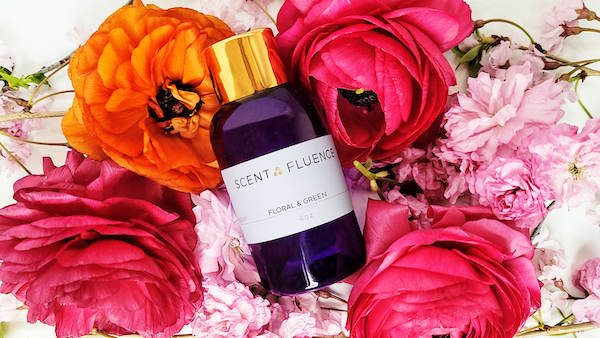
ScentFluence is the place to fall in love with a unique Valentine’s gift for all the loves in your life. Discover a beautiful selection of candles, unique luxury diffusible scents (1-Hotels, Arlo, Auberge Resorts…) as well as 70 others ambient scents and elegant diffusers to help your love take flight well past February 14th.
ScentFluence 22 Harwood Court, Scarsdale Village. Tuesday – Saturday 12-5pm or visit scentfluence.com.
Share the Love with I Am More Scarsdale this Valentine’s Day, featuring the best in fashion and accessories. For the ladies in your life, consider our featured assortment of pouches, clutches and totes from BTB Los Angeles, DLD Beach, Florabella, Hi Love Travel and TRVL ($40-$378), spring sweaters and blouses from Allison, Brodie and Cami NYC ($108-$165), and Voile Blanche’s new spring raffia platform sneaker in rose ($265).

Don’t miss out on our last call for end of season blowout savings up to 70% off most fall and winter merchandise. Discounts are available in-store and automatically applied online.
Located at 6 Spencer Place in Scarsdale, I Am More Scarsdale’s mission is to empower women to make them feel confident, to support women-owned businesses and designers, and to give back to local and women’s philanthropic organizations.
 Greenwich Medical Spa is founded on deeply personalized care to ensure your non-surgical facial and body contouring treatments perfectly align with the results you seek. Our nationally recognized team works closely with you, providing award-winning care and results found nowhere else. It’s this five-star service that keeps us in the top 1% of medical spas nationwide. Greenwich Medical Spa in the Golden Horseshoe invites you to create your perfect pout this Valentine's Day! Greenwich Medical Spa is giving away a free Lip Filler treatment this February to one lucky winner. Don't forget to follow the rules in order to be entered, good luck! Enter now.
Greenwich Medical Spa is founded on deeply personalized care to ensure your non-surgical facial and body contouring treatments perfectly align with the results you seek. Our nationally recognized team works closely with you, providing award-winning care and results found nowhere else. It’s this five-star service that keeps us in the top 1% of medical spas nationwide. Greenwich Medical Spa in the Golden Horseshoe invites you to create your perfect pout this Valentine's Day! Greenwich Medical Spa is giving away a free Lip Filler treatment this February to one lucky winner. Don't forget to follow the rules in order to be entered, good luck! Enter now.






